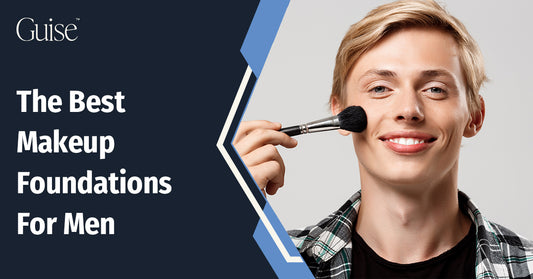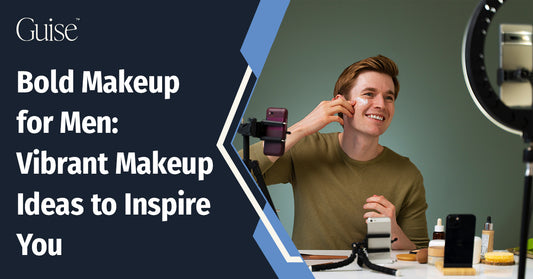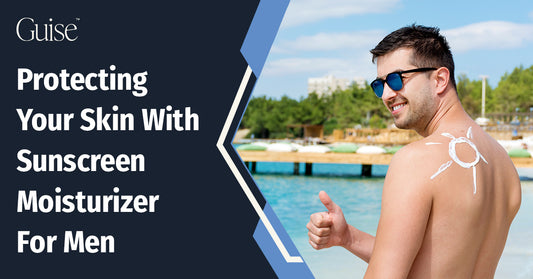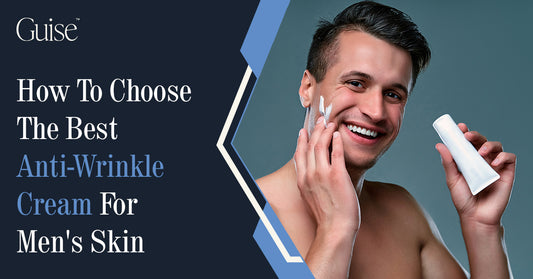Having acne is an incredibly common problem for mens of all ages, but it can be especially frustrating when the redness on your face persists. Redness from acne can make you feel self-conscious and embarrassed, and it can be hard to get rid of. But don't worry – there are several ways to reduce the redness caused by acne!
You can get acne treatments to restore a healthy complexion without harsh treatments or expensive medications with some lifestyle changes and the right skin care products. Let's see how you can reduce redness from acne naturally.
What Is Acne?
When your skin's pores are blocked with oil and dead skin cells, acne develops. This can lead to redness, swelling, and pus-filled bumps on your face, neck, chest, and back. Acne is a common problem, but it can be hard to deal with because it's often painful, itchy, and can leave scars.
It affects the skin's sebaceous (oil) glands and hair follicles, home to fine hairs. In healthy skin, the sebaceous glands release sebum onto the skin's surface through the pore, an opening to a follicle. The follicle is lined with keratinocytes, a type of skin cell. The keratinocytes normally rise to the skin's surface during skin cell shedding. Hair, sebum, and keratinocytes clump together in the pore of an acne patient.
As a result, the keratinocytes are kept from shedding, and the sebum is kept from penetrating the skin's surface. Inflammation, including swelling, redness, heat, and pain, is brought on by bacteria that normally reside on the skin and can grow in plugged follicles when oil and cells are present. Lesions or pimples are produced when the wall of skin barrier the plugged follicle collapses, spilling bacteria, skin cells, and sebum onto the nearby skin.
Symptoms of Acne on Men's Skin
In men, acne is typically characterized by the following symptoms:
- Redness and swelling around the affected area
- Pimples, blackheads, whiteheads, cysts on the face and body
- Painful lumps or nodules on the skin
- Itching and burning feelings in the affected areas
Factors that Cause Inflammation in Men
In the case of acne in men, it is best first to understand what is causing the condition. Acne can be caused by various factors ranging from genetics to lifestyle and environment. Generally, it is caused by a combination of factors rather than one cause.
Bacterial Infection
Bacterial infection is a major cause of acne in men, as bacteria can build up in pores and cause inflammation. This happens when sebum and dead skin cells accumulate, and the pore becomes clogged, creating an ideal environment for bacteria to grow. When the bacteria multiplies, it causes inflammation, redness, swelling, and painful acne pimples.
Hormonal Imbalance
Hormones play a major role in regulating sebum production, and an imbalance may lead to increased oil secretion and clogged pores. Hormonal imbalances can cause inflammation and acne breakouts, as well as redness. It is important to consult your doctor if you suspect that hormones may be causing your acne.
Stress & Diet
Stress and diet can also cause acne in men. Stress can cause the body to produce hormones such as cortisol, which can increase sebum and oil production, resulting in acne breakouts and acne redness. Eating certain foods high in sugar, dairy, and processed ingredients can also increase inflammation, leading to redness and acne.
Genetics
Genetics can also be a factor in acne, as some people are more prone to inflammation than others and acne prone skin is. If one of your parents has had severe acne breakouts, you may be at an increased risk of developing acne. This is why it's important to take extra care of your skin if you have a family history of acne.
Environmental Factors
Environmental factors can cause inflammation and irritation of the skin. Pollutants in the air contain compounds that can worsen existing acne lesions and increase the risk of new breakouts. These pollutants can weaken the skin's barrier function, making it more vulnerable to irritants. Additionally, exposure to UV radiation can cause skin redness, inflammation, and increased sebum production. Cigarette smoke contains chemicals that can irritate the skin and weaken its protective barrier, leading to inflammation.
Medications
Certain medications, such as corticosteroids and oral contraceptives, can also increase the risk of acne. These medications can interfere with hormone levels and cause an increase in sebum production, leading to inflammatory acne due to clogged pores. Additionally, certain antibiotics used to treat infections can lead to acne breakouts due to decreased beneficial bacteria on the skin.
Skincare Products
Certain skincare products can also cause acne in men. Products that are too harsh for the skin, such as those containing alcohol or other irritants, can strip away the skin's protective barrier and leave it vulnerable to bacteria and inflammation. Use the best makeup products for your skin type, and avoid harsh cleansers that can help keep acne breakouts under control.
How to Reduce Acne Redness Naturally
Several natural remedies can be used to reduce redness and inflammation from your acne scars. Some of these remedies include:
Topical Medications
Over-the-counter topical medications containing ingredients like benzoyl peroxide, salicylic acid, and retinoids can effectively treat redness and inflammation from acne. These medications work by unclogging pores, causing less skin irritation, reducing oil production, and promoting skin cell turnover.
Oral Medications
In more severe cases of acne, a dermatologist may recommend oral medications such as antibiotics, isotretinoin, or hormonal medications. These medications target the underlying causes of acne, such as bacterial infection or hormonal imbalance.
Light Therapy
Light therapy is a treatment used to reduce inflammation and bacteria on the skin. It involves exposing the affected area to different types of light, such as blue, red, and near-infrared radiation. This type of laser treatment can be done in a dermatologist's office or with an at-home device.
Chemical Peels
Chemical peels are treatments performed by a dermatologist that for acne treatment involves using a chemical solution on the skin, which causes it to peel away. This reveals newer, unblemished skin underneath and can help reduce redness and inflammation from acne.
Dietary Changes
Eating a diet rich in healthy fats, fruits, and vegetables can help minimize inflammation and improve skin health. Avoiding foods high in sugar, dairy, and processed ingredients can also decrease inflammation and the risk of acne breakouts.
Home Remedies
Several home remedies can be effective at reducing redness and inflammation from acne. Applying a cold compress, such as a damp cloth or ice pack, on the affected area for 10-15 minutes can reduce inflammation and soothe irritated skin. Tea tree oil is known for its anti-inflammatory, antimicrobial, and antiseptic properties, which make it a great natural remedy for acne. Aloe vera gel can also be applied directly to the skin and soothing inflammation, as it has anti-inflammatory and healing properties.
Tips for Dealing With Redness From Acne
Reducing redness and inflammation from acne can be challenging, but there are some actions you can take to help manage it.
- Follow a consistent skincare routine with gentle cleansers and moisturizers that don't irritate the skin.
- Look for skin products specifically formulated for sensitive skin and avoid those containing harsh chemicals or fragrances.
- While scrubbing your face vigorously to remove oil and dirt may be tempting, it can worsen redness and inflammation. Instead, gently massage the cleanser into your skin using circular motions and rinse with lukewarm water.
- Even if you have oily skin, moisturizing regularly is important to prevent dryness and further irritation. Look for lightweight, non-comedogenic moisturizers that won't clog your pores.
- Sun damage can exacerbate redness and inflammation from acne, so it's important to use sunscreen daily. Look for sunscreen with SPF 30 or higher, and reapply every two hours if you spend time outdoors.
- Certain makeup products can contribute to redness and inflammation from acne. Look for non-comedogenic makeup products that won't clog your pores, and avoid those with ingredients known to irritate the skin.
- Touching your face can move bacteria and oil from your hands to your skin, leading to further inflammation and redness. Avoid touching your face and use clean hands when applying skincare products or makeup.






